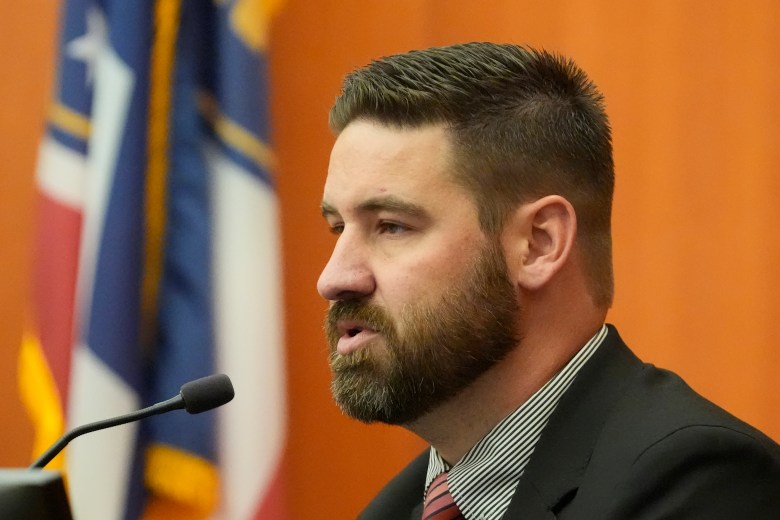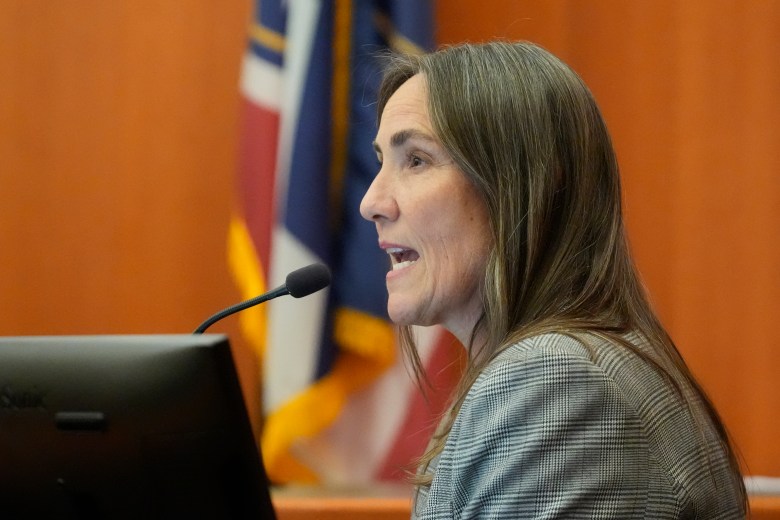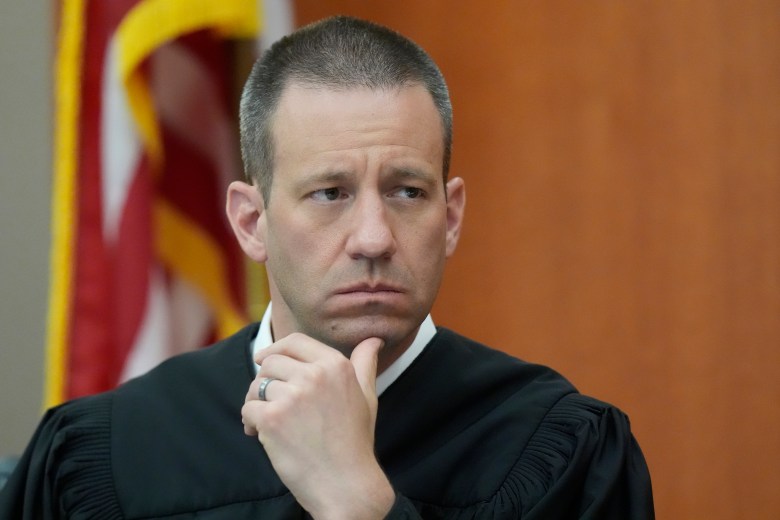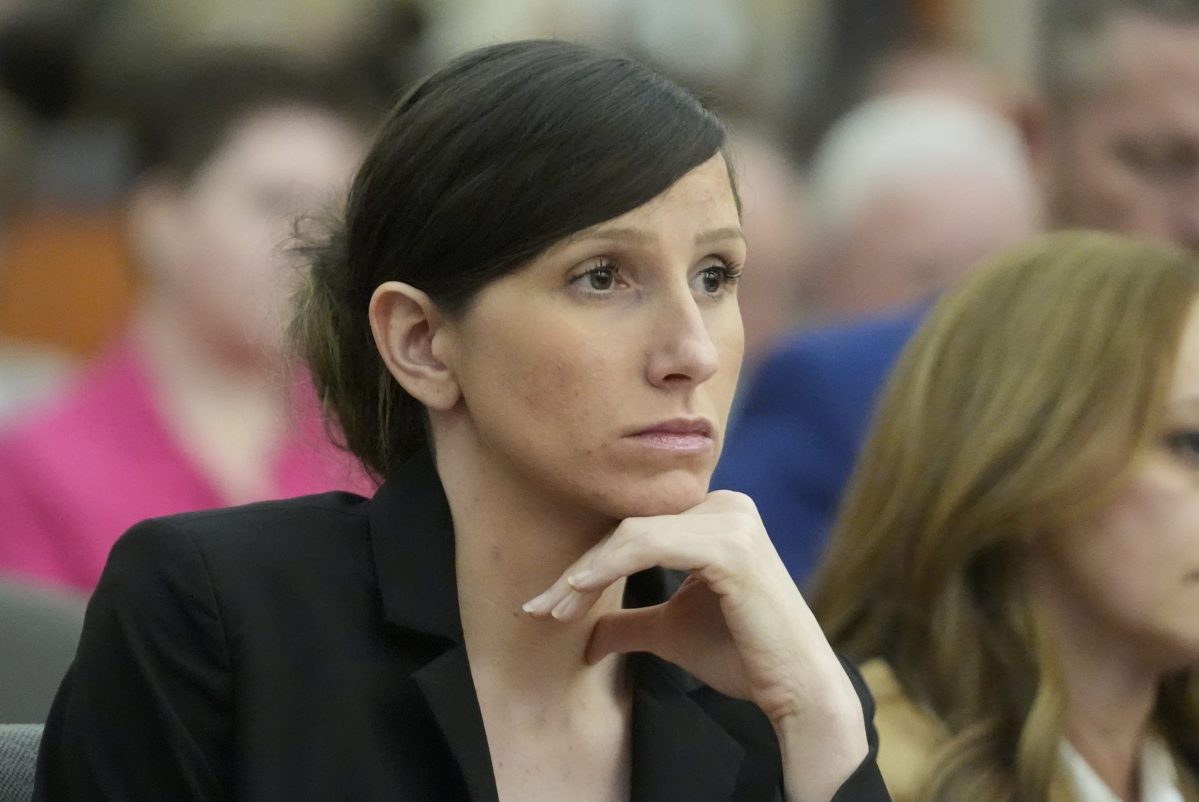Summit County prosecutors on Monday laid the foundation to decide whether Kouri Richins will stand trial for the death of her husband.
The Kamas mother of three appeared in a packed Third District Court on Monday morning for the first day of a multi-day preliminary hearing that will determine whether there’s enough evidence to proceed with the case.
Kouri, 34, is accused of fatally poisoning Eric Richins, 39, in their family home with a fentanyl-laced Moscow mule in early March 2022. Kouri was arrested in May 2023 and faces 11 felonies including aggravated murder, attempted criminal homicide, distribution of a controlled substance, mortgage and insurance fraud as well as forgery.
The Summit County Attorney’s Office presented the court expert testimony supporting prosecutors’ theory that Kouri had financial motive to kill her husband while her defense team highlighted the flaws in the evidence with the goal of maintaining her innocence.
Sheriff’s Detective Jeff O’Driscoll was the first to take the stand. He outlined the steps investigators took to identify Kouri as the primary suspect in the case.

Defense attorney Wendy Lewis questioned the detective about initial searches on the home and subsequent interviews with Kouri.
O’Driscoll described how a housekeeper who worked for the Richins family became a person of interest in the case after investigators discovered suspicious text messages between the woman and Kouri. The woman, who is a convicted felon, was arrested in April 2023 after investigators found drugs and a firearm in her home.
The housekeeper initially denied knowing about the circumstances surrounding Eric’s death and dealing fentanyl, but later agreed to cooperate with the investigation to avoid significant prison time. She received a letter of immunity from the U.S. Attorney’s Office and could be called as a witness during a trial.
The housekeeper alleged Kouri asked to buy up to 90 light blue or green pills believed to be fentanyl. However, O’Driscoll said deputies never found any of the pills when searching the Richins home. The Sheriff’s Office did find THC gummies, loose prescription medication and copper mugs.
O’Driscoll was unable to confirm whether the drugs supplied to Kouri were the same ones taken by Eric when Lewis asked him. She also questioned why the Sheriff’s Office did not investigate other potential suspects, including individuals they were having affairs with.
Private investigator Christopher Kotrodimos analyzed the digital evidence in the case. He testified the history on Kouri’s devices had been deleted and identified call records from January 2022 to mid-March 2022 between Kouri and the housekeeper, as well as Kouri and her paramour.
The two began communicating as soon as November 2021, with daily communication between the two through March, according to Kotrodimos. They were having ongoing conversations around the time of Eric’s death.
Kotrodimos also noted phone activity during the night Eric died, including the device being unlocked around 3:07 a.m. and a 911 call being placed about 15 minutes later.
Defense attorney Alex Ramos questioned Kotrodimos about his device extraction certifications, which were completed in 2013 and 2017 and have not been renewed. Kotrodimos also said he did not complete the extractions himself, he just reviewed the data.
“You just read it. You read what was spit out. … Everything you’ve testified to is basically because you’ve read it,” Ramos said.
Brooke Karrington, the state’s financial expert, spoke about Kouri’s alleged financial crimes.

The forensic accountant reviewed bank account statements, real property like trust deeds and loan documents belonging to Kouri and Eric Richins. She examined the Richins’ joint account, Kouri’s personal account and separate business accounts for Kouri and Eric.
Karrington described the real estate market in 2019, when Kouri’s real estate business started, and how a home equity line of credit was taken out on the family home. The house was in Eric’s name, and so was the $250,000 loan. Yet it was actually Kouri who signed, using power of attorney, Karrington said.
Kouri took out multiple withdrawals using the loan in August 2019, around the same time she started buying and flipping homes for her business. She purchased several homes around $400,000 throughout 2020 before taking on a more ambitious million-dollar property.
The high cost required Kouri to seek outside investments including utilizing hard money lenders, according to Karrington.
Eric consulted a divorce attorney in October 2020. Karrington said financial arrangements were made after Eric discovered the home equity loan. That’s when he set up his will and trust, naming his children as beneficiaries and his sister as the trustee rather than Kouri.
Defense attorney Kathryn Nester noted Eric didn’t proceed with the divorce.
There were at least six instances when Kouri allegedly falsified bank information using statements from her husband’s construction company with the K Richins Realty header to appear as if the money were in her business. This allowed her to take out more loans.
Kouri owned about 15 properties in 2021. Karrington said Kouri owed about $4 million on the real estate in December.
There was also between $500,000 and $600,000 in personal property loans. Kouri made around 100 debt payments in that month, with at least one totaling more than $5,000 a week.
Nester argued Karrington’s calculations do not factor in the profit margins from selling the properties after they were fixed and flipped. None of the homes were foreclosed on until after Kouri was arrested in May 2023.
Karrington said there were some home sales that did not cover the outside investment, and trust deeds were used to pay it back. She said the home equity loan was over its limit and credit lines had been exceeded or close to maxed out. Kouri ended 2021 almost $40,000 in the hole, according to Karrington.
The forensic accountant also detailed around $1.5 million in life insurance policies on Eric — Nester noted the largest of those was taken out more than five years before his death — as well as a buy-sell agreement he had with his business partner. Prosecutors have alleged in court documents Eric was unaware of some of the policies, or changes made to them.

Judge Richard Mrazik called the court to recess around 5 p.m. There were no witnesses scheduled to be called. The defense said Kouri will waive her right to testify.
The preliminary hearing was scheduled to resume at 10 a.m. on Tuesday. Mrazik is expected to rule on whether there’s enough evidence to proceed with the trial.

